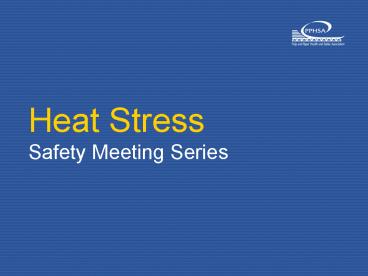Heat Stress Safety Meeting Series - PowerPoint PPT Presentation
1 / 15
Title:
Heat Stress Safety Meeting Series
Description:
During heavy work, a body can lose 1-2 liters of water per hour. ... is unlikely if your pulse rate is under 100 beats per minute after 1 minute rest. ... – PowerPoint PPT presentation
Number of Views:623
Avg rating:5.0/5.0
Title: Heat Stress Safety Meeting Series
1
Heat StressSafety Meeting Series
2
What is it?
- Heat stress is the buildup in the body of heat
generated by the muscles during work and of heat
coming from warm and hot environments. - Heat illnesses result when the body is subjected
to more heat than it can cope with.
3
Why worry about it?
- Heat can kill!
- Work-related heat stroke fatalities
- 1990 student, second day collecting garbage
- 2001 bakery worker in Barrie
- According to Environment Canada on August 9, 2001
outdoor temperature in Barrie is 33.4C, and
humidity was 30 so the outdoor humidex was 36C
and the outdoor WBGT was 24.8C - If temperature in the bakery was estimated to be
52C and if the humidity inside was 10, then
humidex would have been 54C for the workplace
4
True or False?
- High internal temperature makes blood vessels
expand and the heart rate quicken. - A heat stroke can be fatal.
- Sweating cools the body.
- Operation of the bodys cooling system can result
in - Rashes
- Dizziness
- Swelling
- Fainting
- Death
- If you dont feel thirsty, there is no need to
drink water. - As long as you drink a sufficient amount, the
timing of it doesnt matter.
5
Physiology of Heat Stress
- During both rest and activity, the human body
tries to maintain an internal temperature of - 37 C or 98.6 F.
- (/- 1 C or 1.8 F)
6
Physiology of Heat Stress
- Hot weather, heat sources, and hard work raise
the bodys core temperature. - Heated blood is pumped to the skins surface,
where body heat transfers to the environment, if
cooler. - If heat has to be shed faster, sweat carries it
outside skin and evaporates to aid cooling.
7
Physiology of Heat Stress
- During heavy work, a body can lose 1-2 liters of
water per hour. - After 2-3 hours of fluid loss, a person is likely
to - Lose endurance
- Become uncomfortable
- Feel hot
- Become thirsty
8
Physiology of Heat Stress
- The longer a body sweats, the less blood there is
to carry excess heat to skin or oxygen and
nutrients to muscles. - After 3 hours, a dehydrated worker may
experience - Headaches
- Muscle fatigue
- Loss of strength
- Loss of accuracy and dexterity
- Heat cramps
- Reduced alertness
- Nausea
9
Physiology of Heat Stress
- Water is key to cooling body and combating heat
stress. - Without fluid replacement during an extended
period of work, the body is at risk of
exhaustion. - Untreated heat exhaustion may lead to heat
stroke.
10
Health Effects
- When heat gain exceeds the ability of the body
to compensate, heat illnesses can result - Heat rash, other skin ailments
- Sunburn
- Heat cramps
- Fainting
- Heat exhaustion
- Heat stroke
11
Everyones Different
- People come in many shapes and sizes and with
different tolerances for heat. - Personal factors affecting tolerance include
- Activity level (metabolic heat)
- Fluid intake and electrolyte replenishment
- Alcohol and drug use
- Acclimatization
- Age
- Physical fitness
- Body fat
- Diet
12
Controlling Heat Exposure
- Acclimatization
- Engineering controls
- Administrative controls work practices
- P.P.E.
13
Controlling Heat Exposure
14
Hydration
- Fluid Replacement is extremely important!
- More than you want just to satisfy your thirst
- Sources of water are
- 1. Fluids - 1 cup or 8 oz 240 mL every 20 min
- 2. Foods - fruit veggies are 90 water
- Maximize the amount you drink by ensuring the
water is not too cold, but not lukewarm
15
Things You Can Check
- Look for typical heat strain symptoms feeling
over-heated, fatigue, headache, nausea, weakness,
dark concentrated urine, etc. - Sweat that drips off your body no longer allows
for cooling by evaporation thus, unless theres
another medical reason for it, this is a sign
that your body is heating up. - Check your pulse heat stress is unlikely if your
pulse rate is under 100 beats per minute after 1
minute rest.































